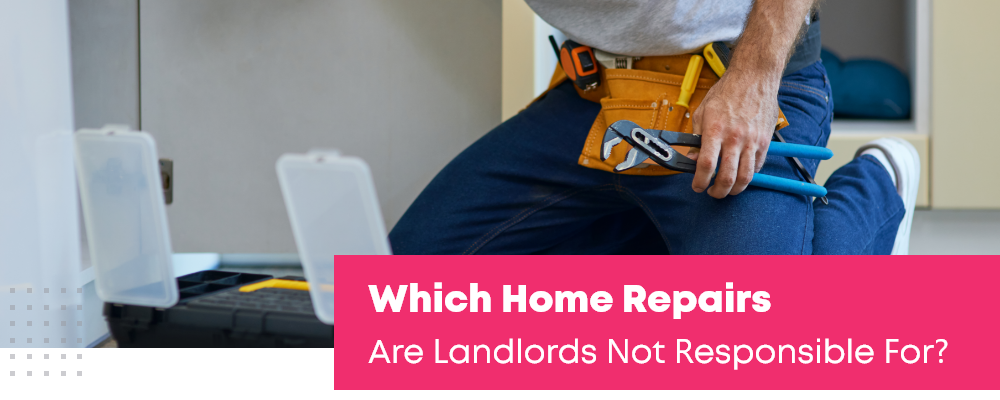Which Home Repairs Are Landlords Not Responsible For?
There is a common misconception among renters that landlords are responsible for fixing anything that breaks, wears out, or does not work in a unit. This is far from the truth. But sometimes the lines can be blurred as to who is responsible for what. Having an iron-clad lease agreement for all tenants where repair responsibilities are explicitly laid out allows everyone to get on the same page and avoid unnecessary disagreements and subsequent tenant turnover.
Additionally, as a landlord, you should let tenants know that they should not make major repairs themselves without your consent and state such in the lease. Depending on the repair, you may prefer to use your own contractor or even do the work yourself, and simply send the bill to the tenant if it’s their responsibility. Finally, when creating a lease agreement, landlords should keep in mind that tenants have a right to habitable living conditions in every state. Let’s explore some of the kinds of repairs landlords are not responsible for. Keep in mind that some repairs are dictated by local and state laws, so be sure to always stay up to date on them.
What is a landlord NOT responsible for in a rental property?
- Regularly Discarding Trash: This should be self-explanatory; however, some property owners offer valet trash services to their tenants. While the landlords are responsible for making sure the valet trash providers are collecting the trash, it is ultimately the tenant’s responsibility to discard the trash in the appropriate place where it can be picked up by the valet trash attendants.
- Running Toilets: Everyone has dealt with a running toilet before and the fix for it is super simple and definitely not something a landlord needs to come and repair. YouTube and Google are great resources to help someone fix an issue like this and will give tenants an opportunity to learn something new for themselves.
- Minor Plumbing Clogs: Chances are that if sink plumbing is backed up, it’s because of something that was or wasn’t done. Food should be thrown away in the trash to avoid build-up and hair should be removed from shower drains to avoid clogging. Simple acts like this should help avoid minor clogs. If a toilet is showing signs of clogging and cannot be fixed with a plunger, there may be a deeper issue that should be investigated. This is a good time for a tenant to contact the landlord.
- Bathroom Caulking: As gross as it might become, caulking isn’t something a landlord has to fix unless the water is leaking and creating water damage. But if the caulking is starting to peel or get grimy, it is possible for a tenant to replace the caulk, but they should always contact the landlord prior to making any kind of repairs in the unit.
- Issues Due to Misuse of Property (per the lease agreement): If your tenants have done anything violating their lease agreement that needs painting, repairs, or additional cleaning, they would be responsible for repairing that damage. Common examples of this would be if they are smoking on the property and it leaves stains or smells. Similarly, if your lease agreement says no pets, but they’ve had a pet, the tenant would be responsible for cleaning costs and any damage incurred associated with the pet.
When Should Landlords Pay for Repairs?
In general, landlords are responsible for anything that breaks due to age, normal wear and tear, or that presents a safety issue. Common repairs landlords should pay for include:
- Pest infestation (unless it’s a direct result of tenant negligence)
- Broken locks (only if the tenant is not at fault)
- Plumbing issues
- Electrical issues
- Heating repairs
- Visible mold
Depending on the state, if you don’t fix an issue that inhibits habitability within a certain time frame, tenants may have the right to make those types of necessary repairs themselves (or through a contractor) and deduct rent to pay for them, often referred to as “repair and deduct.”
When Should Tenants Pay for Repairs?
Tenants are typically responsible for minor inconveniences and damages incurred themselves. Common repairs tenants should pay for include:
- Damages caused by a pet (i.e., chewed blinds or soiled carpet)
- Burnt-out lightbulbs (easy, quick fix tenants can do themselves without contacting the landlord)
- Any damage caused by the tenant or their guests (broken windows, doors, or appliances)
- Stains or smells from smoking inside a non-smoking unit
- Any issue that was left for a long period of time without being reported, therefore worsening a situation that could’ve been easily remedied if the landlord was notified in time
It’s best for tenants to abide by the terms of the lease and avoid any sort of damage to the property. However, things happen, and the tenant will be legally obligated to pay for the repairs for the damage they’ve caused. As the landlord, it’s important to encourage your tenants to communicate with you about repairs and responsibilities. It’s better to know about damage when it happens than be surprised right before the tenant vacates or immediately after.
